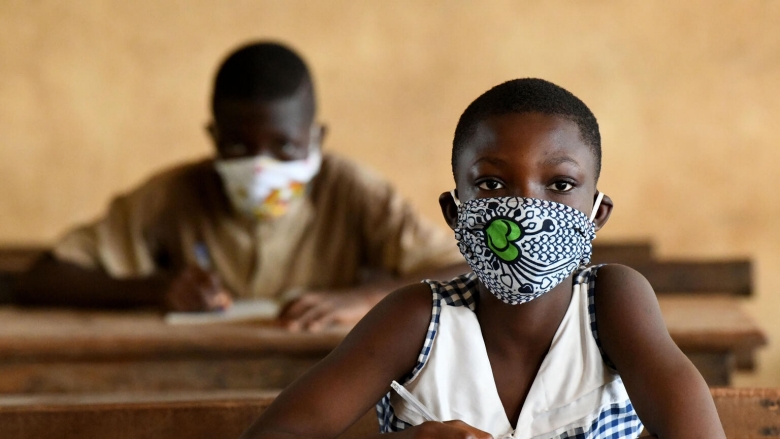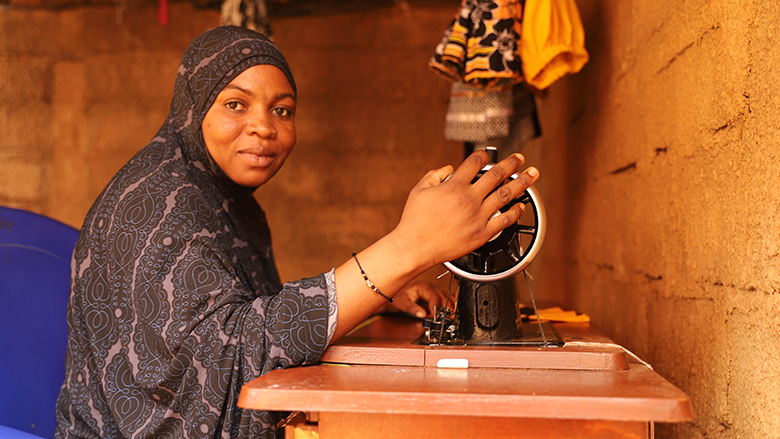Click on the interactive ‘ELP Footprint (Map)’ to see a summary of the country-level work financed by ELP highlighting four specific work programs: catalytic country grants, Early Years Fellows, Early Childhood Policy Academy and Early Systems Research.
Early Learning Partnership
Country Work
Click the links below to access more detailed information on the ELP country grants.
Grants awarded on a rolling basis (2012-2019): This funding period supported the expansion of early childhood development while ensuring quality.
- Childcare: In partnership with the Invest in Childcare initiative, grants under this theme aim to support World Bank task teams and countries to identify pathways to expand access to childcare, make the case for childcare, and design, implement, and evaluate operations an policy changes related to childcare.
- COVID-19: This emergency funding round aimed to ensure young children and their families were supported with services and information that promote young children’s development within the context of the World Bank’s COVID-19 response and programming (through emergency projects, existing projects, and longer-term planning).
- Quality, Early Learning: Grants under this theme aim to support operational and analytical activities to improve the quality of ECE services being delivered within government programs and World Bank-financed projects.
- Parenting and Caregiving: Grants under this theme aim to support World Bank teams to strengthen parenting interventions and empower parents and caregivers to improve the quality of their interactions with their children and better address the causes and consequences of adversity.
- Read@Home: In partnership with the Read@Home program, grants under this theme aim to expand opportunities for children to read and home in the languages spoken at home, by working with countries to identify, test, and implement cost-effective approaches to develop, produce, procure, and distribute quality reading materials, and working with parents and caregivers to engage with children’s learning.
- ECD in Fragility, Conflict, and Violence (FCV): Grants under this theme aim to make the case for investment in ECD in FCV and forcibly displaced settings and to support the design and implementation of quality operations at scale.
- ECD Measurement: Grants under this theme aim to support ECD measurement activities that produce more and better data on ECD outcomes and early learning environments to informing policies, programs, and interventions and strengthen ECD systems.
See examples of impact over the years through the ELP grants.
 Bangladesh: Supporting the landscape of Early Childhood Education
Bangladesh: Supporting the landscape of Early Childhood Education

Grant Period: 2015-22 | ELP Funding: $488,307
In Bangladesh, ELP funding has helped stimulate evidence-based investments in early childhood education (ECE) and supported an expansion of pre-primary from one to two years and introduced an advanced certification for pre-primary teachers. Enrollment in pre-primary education in Bangladesh is below the regional average in South Asia, despite recent gains. To support dialogue with the Government of Bangladesh and future investment in pre-primary education, the World Bank Bangladesh team used an initial ELP grant ($44,000 awarded in 2019) to fund an assessment of the existing one-year pre-primary education program. This assessment found that a child was 37 percent more likely to be developmentally on track if they had attended pre-primary education, compared to a child who did not attend pre-primary education. The assessment also found that the quality provision of pre-primary education was hampered by a shortage of qualified teachers. The report recommendations were used to advocate with the Government of Bangladesh to expand pre-primary to include an additional year and to invest more in building the capacity of pre-primary teachers and headteachers. The report also contributed as a key input into the Bangladesh Education Sector Plan 2021-25 where ECE has been highlighted as a priority area and ultimately selected as an area for investment using the Global Partnership for Education Sector Implementation Grant (ESPIG) to Bangladesh in the amount of US$ 53.9 million. Based on the evidence generated by the WB’s assessment, the ESPIG was designed to expand pre-primary education to include an additional year, introduce an advanced certification for pre-primary teachers and first-time training for head teachers managing preschool education (starting in July 2021). A second ELP grant ($99,000 awarded in 2020) is funding technical assistance to review the current teacher training curriculums for pre-primary, conduct a survey on teacher and headteacher training needs and provide an opportunity to further improve quality and promote learning through play. These assessments will provide evidence to the Government to move forward and influence future financing.
A grant under the childcare thematic round ($75,000 awarded in 2019) financed a situation assessment that used a mixed method approach to (i) understand the current status of caregivers and childcare services in Bangladesh and (ii) assess the current training programs available and opportunities for professional development for the childcare workforce. The study investigated the socio-economic profiles, training acquired and perceptions of skills gaps and the environment in which child caregivers and center managers operate across different types of providers. It then provided key recommendations along four areas: polices, quality caregivers, pedagogical approach and enabling environment. The final report was published in January 2022 and will inform the design and roll out of a competency-based national training curriculum for childcare accredited by the government.
 Ethiopia: Supporting child development through multiple sectoral entry points
Ethiopia: Supporting child development through multiple sectoral entry points

Grant Period: 2015-22 | ELP Funding: $603,000
In Ethiopia, five ELP grants across multiple sectors have supported ECD programming for young children using multiple entry points. ELP funds have supported the Ethiopian government to expand access to quality pre-primary school (known as “0 classes”). The first ELP grant of $150,000 (awarded in 2016) was used to develop content for what would become a $60 million ECE component in the World Bank’s Ethiopia Education Results Based Financing Project, which used disbursement-linked-indicators to finance ECE and ensure performance. The second ELP grant of $50,000 in 2017 financed the development of coaching and supervision instruments for principals and cluster supervisors to improve quality in 0 classes. The Early Years Fellow working with the World Bank team and the Ministry of Education from 2017-2019 played a key role in designing the ECE activities and worked with the government to develop the disbursement-linked indicator to ensure funding will be disbursed only when results are achieved.
A third ELP grant of $43,000 (awarded in 2020) was used to develop material and messaging for parents enrolled in an Urban Productive Safety Net Program during COVID-19 on early stimulation, coping and playful parenting; these messages reached 500,000 households with young children. In 2020, two more ELP grants were awarded to teams to pilot childcare approaches in rural and urban settings and are developing models that can be scaled up through future large-scale investments.
 Peru: Ensuring the delivery of national ECD services during COVID-19
Peru: Ensuring the delivery of national ECD services during COVID-19

Grant Period: 2020-21 | ELP Funding: $50,000
In Peru, ELP funds ensured continuity in ECD service delivery during the COVID-19 crisis for Cuna Más, the Peruvian Government’s National ECD program, which aims to improve children’s cognitive, social, physical and emotional development. The program targets children below the age of 3 in poor areas and implements two modalities: daycare centers and home visits. The program reaches approximately 55,000 children in daycare centers, and 105,000 through home visits. In response to the COVID-19 crisis, the Government of Peru temporarily suspended childcare services including Cuna Más and requested urgent technical assistance from the World Bank to adapt both modalities to the COVID-19 context.
ELP funding was critical to finance the technical assistance, ensure continuity of early stimulation activities and roll out efforts to address caregiver stress and anxiety. When the pandemic restricted mobility, the grant supported the development of guidelines to implement remote counseling services for parents and caregivers. Community volunteers applied these guidelines to reach parents through 30-minute scripted phone calls every week and small group exchanges for two hours each month. These virtual visits were followed up with text messages, tailored according to families’ communicated interests and needs, and reinforced content discussed during individual and group sessions. For families in more remote areas that did not have a cell phone or service, community volunteers carried out individual counseling with walkie talkie radios and used megaphones, loudspeakers or other forms of mass communication available in the community to share messages for group counseling. By October 2020, remote counselling reached 170,000 families. The grant also supported the development of a mobile application for program field staff to support volunteers in monitoring remote counselling services. Lastly, ELP financed the development of a new educational program called, “Más Expertos” (More Experts). Based on engagement with existing beneficiaries through interviews and phone surveys, the team has developed 30 sessions which will be broadcast nationally through radio and social media to reach families enrolled in the program and hundreds of thousands of new families with practical ways to prevent the spread of COVID-19, deal with stress and support children’s healthy development through preparing nutritious meals, telling stories and play.
 Senegal: Investing in the Early Years for Human Development
Senegal: Investing in the Early Years for Human Development

Grant Period: 2017-21 | ELP Funding: $100,000
The Senegal Investing in the Early Years Project was approved by the World Bank Board in September 2018. It is a $75 million project, co-led by the health and education teams, with an integrated approach to support young children and their families that will:
Reach 2.5 million parents and young children by integrating parenting education and early stimulation within community-based nutrition services (increasing coverage from 19% to 65% in targeted regions)
Enroll 210,000 children in formal preschools with improved quality standards and teacher training (doubling the current enrollment rate in targeted regions) and launch 3,000 community-based preschools in partnership with Koranic schools and parent-teacher associations
Register 600,000 births to ensure children have access to essential services (increasing the rate from 46% to 60% in targeted regions)
ELP funding was critical to boost available project preparation funding and the Early Year Fellows were integral team members, in particular ensuring coordination with the other World Bank Group projects being prepared in Senegal on basic education, health/nutrition and social protection. ELP funding was also critical to adapt to the COVID-19 context, working with the Government to launch the Read@Home initiative and reach 50% of all children aged 0-6 with storybooks in local languages along with support for parents to read with children. ELP funds are also supporting the Government to roll-out the first-ever national ECD survey in Senegal, which will provide information on children’s cognitive and socio-emotional development and the quality of early learning settings, in partnership with the national statistics agency, UNICEF, WHO and USAID's Demographic Health Surveys (DHS).


